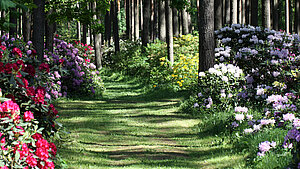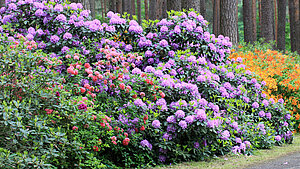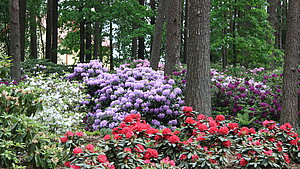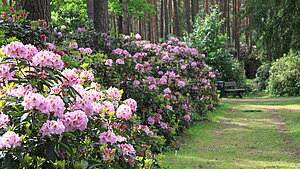The Rhododendron Breeding and Testing Nursery "Babīte" was established in 1980 at the University of Latvia. The nursery covers 11,8 ha in a pine forest near Riga, village Spilve of Babīte Municipality. Professor Rihards Kondratovičs (1932–2017) is the founder of the nursery. He has done research of rhododendrons for 60 years. This is the only specialized rhododendron nursery in the Baltic States.
The nursery cooperates with a number of similar profile scientific institutions abroad: University of Helsinki, Rhododendron-Park Bremen and the Botanical Garden, the Warsaw University Botanical garden, the Royal Horticultural Society in the United Kingdom, the German Rhododendron Society, American Rhododendron Society.
The collection of the nursery encompasses 115 rhododendron species and 403 cultivars most adapted to Latvia’s climatic conditions. There have been made 688 crosses in different combinations, grown many thousands of seedlings from hybrid seeds and distinguished several hundreds of perspective hybrids from seedlings. 153 cultivars are local bred and have been included into the International Rhododendron Register and Checklist of the Royal Horticultural Society, United Kingdom.
Every year, during the flowering season (in May and June), the nursery is visited by around 30 000 people. When plants are on sale, in spring (April, May, June) and in autumn (August, September, October), there are around 4 000 plants sold.

To contribute to the conservation of globally threatened rhododendron species, nursery has joined the Global Conservation Consortium for Rhododendron.
The main tasks of the nursery are:
- introduction and breeding of rhododendrons; creation of new ornamental and winter-hardy plants suitable for the Latvian agro-climatic conditions;
- testing of new plant varieties according to the UPOV (the International Union for the Protection of New Varieties of Plants) guidelines;
- improvement of existing and development of new, effective methods of generative and vegetative rhododendron propagation;
- improvement of agro-technical methods, elaboration of methods and techniques for disease and pest control;
- examination of theoretical and practical aspects of plants endurance physiology relating to physiological and biochemical changes during the process of ecological adaptation of rhododendrons;
- participation in the protection program of globally threatened rhododendron species;
- cooperation with similar institutions in Latvia and abroad with exchange of seeds and seedlings;
- participation in student training; organizing the placements for students as well as expanding closer cooperation for writing bachelor’s, master’s and doctoral thesis;
- plant popularization on TV, radio and the other media;
- supplying high quality planting material, consultations and literature required to clients.

 CONFERENCE
CONFERENCE


